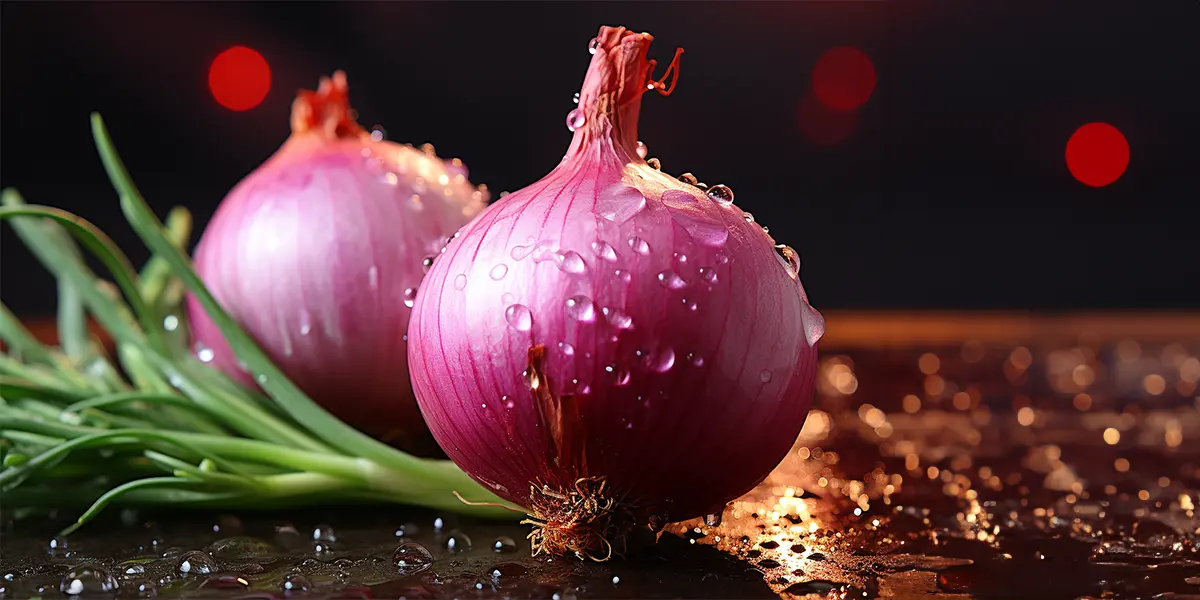Is Onion Good for Diabetes?

“I don’t like onions because usko khane ke baad muhh se smell ati hai. Yuck!”
This is a sentiment we can all relate to, but we all love onions in our favorite dishes, like birista (fried onion) on pulao, paneer tikka, and kebabs. Onions don’t have their own identity as a solo vegetable, but at the same time, we can’t imagine our favorite sabzis and dishes without them… like without onions, your favorite pav bhaji, chole, masala dosa, biryani, bhurji, and so many more dishes won’t have the same punch!
Onions are a staple in most Indian kitchens and are like silent heros, adding flavor and depth to any dish its added to.
But when it comes to diabetes, is onion good for you? So, in this blog we will be answering your question and help you understand the importance of onion in our daily food, whether you have diabetes or not.
Is Onion Good for Diabetes?
Something like an ‘onion ki sabji’ is unheard of. Onions are mostly used as the gravy base or masala of a dish or used as finely chopped or juliennes added to a dish. But here’s the thing.
To truly notice the impact of onions on our blood sugar levels (and diabetes), one must consume them as is, and this typically happens only when we have onions as a part of salad. Therefore, it’s inconclusive whether onions are definitively beneficial or not for diabetes.
However, considering their nutritional benefits (given below) and the importance of including vegetables in our diet, we can say that onions are generally good for diabetes.
How Do Onions, in Combination with Other Foods, Work Together in Managing Diabetes?
No single food, whether a vegetable, fruit, or grain, can manage diabetes on its own. They can only help when combined or along with other food items. Let’s understand this specifically for onions.
- One wouldn’t just have plain onions along with rice or roti, atleast on a daily basis. Onions are typically a part of the sabji or gravy, which is then served as an accompaniment to roti or rice.
- So, the point is that onion in itself won’t spike your blood sugar much because it’s part of a dish that has other vegetables, too. It’s the carbs that you have in the form of rice or roti that causes the spike.
To know your chances of Diabetes reversal, take the Diabetes Reversal TestDiabetes Reversal
Calculator
What Makes Onions ‘Unhealthy’?
When you eat onions with maida ka kulcha, chow mein, noodles, or everyone’s favorite onion pizza, it becomes UNHEALTHY because the majority of carbs come from the pizza or kulcha, which is made with maida (refined flour).
But if you cook onions with bhindi ki sabzi or lauki ki sabzi, it becomes a HEALTHY option as most of the healthy nutrients come from the main sabzi, like lauki or Shimla mirch. So, onion is a healthy vegetable to eat, but its effect on blood sugar depends on how you cook it and with what ingredients.
What is the Nutritional Value of Onion?
As per IFCT, 2017, a medium-sized onion contains approximately:

What is the Glycemic Index (GI) of Onion?
The glycemic index (GI) of onions is relatively low, with a value of around 10. Foods with a low GI are absorbed more slowly, causing a gradual rise in blood sugar and insulin levels, which can benefit people with diabetes.


Can Onions Actually Help Manage Diabetes?
Onions are widely used in Indian cuisine, from curries to salads. However, their impact on diabetes management isn’t straightforward.
Onions have certain nutritional benefits, but their impact on blood sugar solely depends on how and with what ingredients you cook them, as we mentioned earlier in the blog.
Speaking only about onions, they are a healthier choice for people with diabetes and can help manage diabetes to some extent because of their low carbohydrate content, low GI, fiber content, and other nutritional values.
They are great as a part of your meal (like in salads), not a meal by itself.
At Fitterfly, we always recommend our members include a salad in their diet, and onion is one of the vegetables we recommend to eat as a salad along with other raw vegetables like tomatoes, cabbage, cucumber, etc.
However, they can be included in a balanced diet that supports overall blood sugar regulation. Their fiber content helps slow down the absorption of sugars, and their low GI means they don’t cause rapid blood sugar spikes.
What are the Benefits of Onions for Diabetes?
1. Low Glycemic Index: Helps maintain stable blood sugar levels.
2. Rich in Antioxidants: Contains quercetin, which has anti-inflammatory properties.
3. High Fiber Content: Aids in digestion and helps slow down sugar absorption.
4. Nutrient-Dense: Provides essential vitamins and minerals without adding many calories.
Types of Onions and Their Benefits
1. Pink Onion/Regular Onion
Pink onions, commonly used, have a mild flavor and are often consumed raw in salads. They are mainly used as an accompaniment to complete your sabzi and are essential in making gravies and curries. They are rich in antioxidants and can be a crunchy addition to your diet.
2. White Onion
White onions have a sweeter taste and are frequently used in cooking. They contain slightly more sulfur compounds, which are beneficial for heart health.
3. Spring Onion
Spring onions or green onions have a milder flavor and are often used in sabzi, garnishes, and salads. They are lower in calories and can be a fresh, crisp addition to various dishes.
How to Add Onions to the Diabetes Diet?
1. Salads
Onions can be added to salads for an extra crunch and flavor. For example, a simple salad with sliced onions, cucumbers, and tomatoes can be a refreshing side dish.
2. Chilla
Chilla, a savory dish made from besan (gram flour), often includes finely chopped onions to enhance its flavor and texture. Onions add a slight crunch and a burst of flavor, making chilla a delightful breakfast or snack option that is both nutritious and diabetes-friendly.
3. Spring Onion Paratha
Spring onion paratha is a delicious stuffed paratha made with finely chopped spring onions.. This paratha is tasty, especially when you eat it with dahi or vegetable curry.
4. Onion Bhaji/Pyaz ki bhaji/Pyaz ke pakode
Onion bhaji, or pyaz ke pakode, are a popular snack. Made by dipping sliced onions in a spiced besan batter and deep-frying them, they are crispy and delicious.
To keep them healthier, you can opt for air-frying instead of deep-frying, making it more diabetes-friendly.
5. Zunka Bhakar
Zunka Bhakar is a traditional Maharashtrian dish where “zunka” is a spicy onion-based besan preparation, and “bhakar” is a type of millet roti. Onions play a crucial role in giving zunka its robust flavor and texture.
This dish is a wholesome and balanced meal, rich in fiber and essential nutrients, making it a good choice for managing diabetes. Just as sarson ka saag and makki ki roti are iconic in Punjab, zunka bhakar holds a special place in Maharashtra.
6. Pyaz ki Sabzi
Pyaz ki sabzi, though not very common, is a simple yet flavorful dish made primarily with onions and basic spices. It’s a great way to enjoy the health benefits of onions in a diabetes-friendly manner.
Sambhar
Adding baby onions to sambhar along with other vegetables gives this nutritious and fiber-rich dish a subtle sweetness and depth.
7. Raita and Chutneys
Onions can be used in homemade raita and chutneys. Onion chutney is a popular accompaniment to dosa and idli, adding a tangy and spicy flavor.
8. Curries
Onions are a base ingredient in many Indian curries. They add richness and flavor to the dish, making it both nutritious and delicious. For instance, South Indian sambar often includes onions for added taste.
9. Sandwiches and Wraps
Adding sliced onions to sandwiches and wraps can enhance their flavor. Onions fit right in, whether it’s a vegetable sandwich with cucumber and tomatoes or a spicy masala sandwich.
When Should You Consume Onions to Control Blood Sugar Levels?
Onions can be consumed at any time of the day. However, pairing them with other low-GI foods during meals can help balance their impact on blood sugar levels.
For example, having an onion salad with a protein-rich meal can help maintain steady blood sugar levels.
Is It Safe to Consume Raw Onions Every Day for People with Diabetes?
It is generally safe to consume raw onions daily in moderation. Their low calorie and carbohydrate content make them a healthy option.
However, excessive consumption of any food can lead to health issues. For instance, some sensitive people may experience acidity, and other get bad breath when eaten raw in the form of salad.
Who Should Avoid Consuming Raw Onions?
While onions are beneficial for most people, some people might need to limit their intake. If you have a sensitivity to onions or digestive issues, consuming raw onions might exacerbate your symptoms.
In such cases, it’s best to eat them in cooked form or consult with a nutritionist.
Reduced HbA1c by HALF in 6 months


6.6%
Happy members
EMI
Guarantee
4.8/5
Diabetes Prime Program
What Are the Side Effects of Consuming Onions for Diabetes?
Onions are generally safe for people with diabetes, but some potential side effects include:
1. Allergic Reactions
Some people might be allergic to onions. If you notice any unusual symptoms like itching or swelling after eating onions, you might be allergic.
2. Heartburn or Acid Reflux
Onions can cause heartburn or discomfort in your chest or throat, especially if you already have digestion issues. If this happens, try eating fewer onions or avoiding them altogether.
3. Flatulence
Onions can sometimes cause gas and bloating. If you experience this, consider moderating your intake.
How We At Fitterfly Can Help You?
So, onions are one such vegetable that is a part of our everyday khana. They make our dishes complete, whether it’s a garma garam pyaz ke pakode, spring onion chilla, or just a simple salad.
Onions are an integral part of our meals and are especially important for those with limited resources, as they often rely on onions.
At Fitterfly, we understand how important it is to manage diabetes while enjoying your meals. Onions are nutritious and can help keep your blood sugar levels in check when included wisely in your diet.
We also recommend our members to include onions in their diet. When creating diet plans, we suggest eating onions in moderation and pairing them with other vegetables like tomatoes, cucumber or cabbage. This not only adds flavor to your meals but also helps in better blood sugar control.
But it doesn’t stop at diet. At Fitterfly, our holistic approach includes personalized guidance from our fitness coaches and success coaches. Our fitness coaches help you incorporate the right exercises into your daily routine, tailored to your individual needs. Our success coaches ensure you stay motivated and on track with your health goals.
Talk to our program advisors by just giving a missed call at 08068507599 to learn more about how Fitterfly can help you manage diabetes and achieve your health goals.
This blog provides general information for educational and informational purposes only and shouldn't be seen as professional advice.
Frequently Asked Questions
How Can Onions Manage Sugar Levels?
While onions do contain carbohydrates, their fiber content helps slow the digestion process, which can aid in maintaining steady blood sugar levels. Including onions in meals with other low-GI foods can help balance their impact on blood sugar.




















